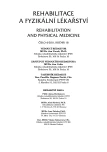-
Medical journals
- Career
Respiratory Muscle Training in Patients with Breathing Disorders
Authors: K. Neumannová; J. Zatloukal
Authors‘ workplace: Katedra fyzioterapie, Fakulta tělesné kultury UP, Olomouc vedoucí katedry prof. MUDr. J. Opavský, CSc.
Published in: Rehabil. fyz. Lék., 18, 2011, No. 4, pp. 188-192.
Category: Original Papers
Overview
A respiratory muscle weakness is typical for different types of diseases – not only for respiratory but also for some neurological diseases. It is necessary to assess strength and endurance of respiratory muscles by using a complex examination. Furthermore, it is important to choose appropriate therapy accordingly to the examination findings. We can use techniques of respiratory physiotherapy, which include respiratory muscle training. Devices like Threshold inspiratory muscle trainer (IMT) and Threshold positive expiratory pressure (PEP) can be used for increasing respiratory muscle strength and endurance in that training.
Key words:
respiratory muscle training, Threshold IMT, Threshold PEP
Sources
1. BECKERMAN, M., MAGADLE, R., WEINER, M., WEINER, P.: The effects of 1 year of specific inspiratory muscle training in patients with COPD. Chest, roč. 128, 2005, č. 5, s. 3177-3182.
2. CAHALIN, L. P.: Pulmonary evaluation. In: DeTurk W. E. & Cahalin L. P. (eds.): Cardiovaskular and pulmonary physical therapy. New York, McGraw-Hill, 2004.
3. CARUANA-MONTALDO, B., GLEESON, K., ZWILLICH, C. W.: The control of breathing in practice. Chest, roč. 117, 2000, č. 1, s. 205–225.
4. ENRIGHT, S., CHATHAM, K., IONESCU, A. A., UNNITHAN, V. B., SHALE, D. J.: Inspiratory nuscle training improves lung function and exercise capacity in adults with cystic fibrosis. Chest, roč. 126, 2004, č. 2, s. 405-411.
5. GOSSELINK, R., KOVACS, L., KETELAER, P., CARTON, H., DECRAMER, M.: Respiratory muscle weakness and respiratory muscle training in severely disabled multiple sclerosis patients. Arch. Phys. Med. Rehabil., roč. 81, 2000, č. 6, s. 747-751.
6. Harik-Khan, R. I., Wise, R. A., Fozard, J. l.: Determinants of maximal inspiratory pressure. The Baltimore Longitudinal Study of Aging. Am. J. Respir. Crit. Care Med., roč. 158, 1998, č. 5, s. 1459-1464.
7. KANDUS, J., SATINSKÁ, J.: Stručný průvodce lékaře po plicních funkcích. Brno, Institut pro další vzdělávání pracovníků ve zdravotnictví, 2001.
8. KLEFBECK, B., NEDJAD, J. H.: Effect of inspiratory muscle training in patients with multiple sclerosis. Arch. Phys. Med. Rehabil., roč. 84, 2003, č. 7, s. 994-999.
9. KOESSLER, W., WANKE, T., WINKLER, G., NADER, A., TOIJFL, K., KURZ, H., ZWICK, H.: Two years experience with inspiratory muscle training in patient with neuromuscular disorders. Chest, roč. 120, 2001, č. 3, s. 765-769.
10. LEWIT, K.: Manipulační léčba v myoskeletální medicíně (5th ed.). Praha, Sdělovací technika, 2003.
11. PALEČEK, F.: Patofyziologie dýchání. Praha, Karolinum, 2001.
12. PAlen, V., Rea, T. D., Manolio, T. A., Lumley, T., Newman, A. B., Tracy, R. P., Enright, P. L., Psaty, B. M.: Respiratory muscle strength and the risk of incident cardiovascular events. Thorax, roč. 59, 2004, č. 12, s. 1063-1067.
13. PRYOR, J. A., PRASAD, S. A.: Physiotherapy for respiratory and cardiac problems. Edinburgh, Churchill Livingstone, 2002.
14. ROCHESTER, C. L.: Exercise training in chronic obstructive pulmonary disease. J Rehabil. Res. Dev., roč. 40, 2003, č. 5, s. 59-80.
15. SMOLÍKOVÁ, L., MÁČEK, M.: Respirační fyzioterapie a plicní rehabilitace. Brno, Národní centrum ošetřovatelství a nelékařských zdravotnických oborů, 2010.
16. TROOSTERS, T., PITTA, F., DECRAMER.: Respiratory muscle assessment in pulmonary rehabilitation. In: Dooner C. F., Ambrosiino N., Goldstein R. (eds.): Pulmonary rehabiliation. New York, Edward Arnold, 2005, s. 69-79.
17. VAN HOUTE, S., VANLANDEWIJCK, Y., GOSSELINK, R.: Respiratory muscle training in persons with spinal cord injury: A systematic review. Respiratory Medicine, roč. 100, 2006, č. 11, s. 1886-1895.
18. WEINER, P., MAGADLE, R., BECKERMAN, M., WEINER, M., BERAR-YANAY, N.: Specific expiratory muscle training in COPD. Chest, roč. 124, 2003, č. 2, s. 468-473.
19. WEINER, P., MAGADLE, R., MASSARWA, F., BECKERMAN, M., BERAR-YANAY, N.: Influence of gender and inspiratory muscle training on the perception of dyspnea in patiens with asthma. Chest, roč. 122, 2002, č. 1, s. 197-201.
Labels
Physiotherapist, university degree Rehabilitation Sports medicine
Article was published inRehabilitation & Physical Medicine

2011 Issue 4-
All articles in this issue
- Effectiveness of Kinesiotherapy in the Treatment of Eating Disorders in the Czech Republic
- The Conservative Therapy for Cervical Spine Instability in Patient with Rheumatoid Arthritis
- Investigation of the Relationship between Urinary Incontinence and Coccyx Syndrome and Pelvic Floor, and with Pain Occurrence in Lumbar Region of Spine
- Respiratory Muscle Training in Patients with Breathing Disorders
- Central Coordination Disorder – Diagnosis for More than the Suckling Age
-
Drinking Treatment by Natural Mineral Waters
Part I: General Introduction - Possibilities of Interconnection between Active and Passive Approach in Physiotherapy
- Terapeutical Approaches for Breathing Mechanics in Patients with Pulmonary Sarceidosis
- Rehabilitation & Physical Medicine
- Journal archive
- Current issue
- Online only
- About the journal
Most read in this issue- Central Coordination Disorder – Diagnosis for More than the Suckling Age
- The Conservative Therapy for Cervical Spine Instability in Patient with Rheumatoid Arthritis
- Respiratory Muscle Training in Patients with Breathing Disorders
- Investigation of the Relationship between Urinary Incontinence and Coccyx Syndrome and Pelvic Floor, and with Pain Occurrence in Lumbar Region of Spine
Login#ADS_BOTTOM_SCRIPTS#Forgotten passwordEnter the email address that you registered with. We will send you instructions on how to set a new password.
- Career

